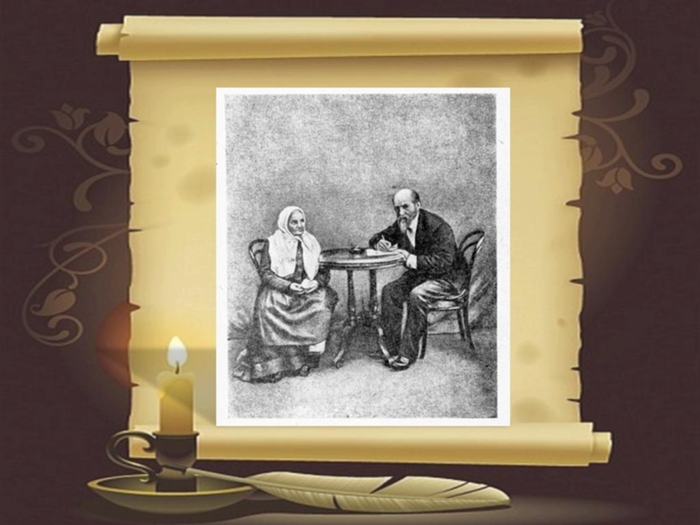|
|
 THE NATIVE PLACEIrina Fedosova... This name is widely known in Karelia. Some people know creativity of the famous "lament singer". And the inhabitants of Zaonezh’e area – villages Tolvuya, Kuzaranda - carefully keep memory of this glorious woman, who lived on their land and made them famous all over Russia. Dostoevskiy, Nekrasov, Rimskiy-Korsakov, Shalyapin admired her creativity... By the end of the nineteenth century she and her creativity raised large interest among scientists, artists, poets, musicians...Our project is one more, not the first and, we hope, not the last attempt to tell about her.Irina was born on April 30, 1831 in Tolvuyskaya district of Olonets region. Zaonezh’e area is the native land of Irina Fedosova. In this epic land, “Iceland of Russian epos”, there is incredibly beautiful nature, unique sunsets and sunrises, still lakes, forests and rivers with clear water. Here, in Zaonehz’e, there is a world famous monument of ancient wooden architecture - Kihzi. Irina is a daughter of this land. Nature, people and history of the places became the main source of her creativity, generated her talent! Undoubtfully, her great art has gone through the century, and will be of great demand further on."Being young, she told, when the girls, her friends, got tired of old songs - knowing her ability, they asked her to sing a new song and got surprised. Where only it came from! "Her voice was clear, free and gentle. Knowing about her talent, she was proud of her talent. "Her songs were remembered and were sung in her village … she composed her songs for the girls". Irina quickly got popularity: at first in nearby villages, then on the whole region and, at last, in whole Zaonehz’e.FAMILY LIFEIrina was married twice, but her children died in infancy. With her first husband, who was 30 years her senior, they have lived happily – the husband did not prevent her to create. Her second husband, Yakov, was a carpenter. In his family Irina got bad attitude. Yakov was a drunker, and his relatives treated her badly. Once next year after their marriage Irina insisted on their going to Petrozavodsk. Yakov would do his carpentry there. In Petrozavodsk she lived 20 years. Irina cooked for the whole carpentry group; Yakov did his work and taught young men his craft.INRICHING HER TALANTIn 1865 she got acquainted with P.Ribnikov, the researcher of the national epos (his records about Fedosova are considered lost), later - with the teacher of a Spiritual seminary E.Barsov. These people have found out in the village poetess unique talent. Barsov wrote: "she was brisk, energetic, cheerful, in full corporal and moral forces, her soul could quickly … create … images". Her memory was huge! About 30 000 verses were written down from her - more than in "Odyssey" and "Iliad"! “Tunes of funeral laments, collected in Olonest region, - writes Barsov, - sharply differ... from usual of other places... Their motives are very simple, quite and doleful, their deep antiquity is felt directly, especially in laments of Irina Fedosova". But her creativity was not only connected with ancient customs, it was directed against authorities oppressing people.THE PEOPLE’S POETRESS FOR CENTURESAfter her husband’s death Irina returned to his house in Kuzaranda. At first she begged, but then when she got money for her performances, Irina began helping the peasants of her village. People from neighbouring villages still remember kindness of this famous woman. When she arrived in Kuzaranda in 1895, she gave 300 roubles on school construction. For that time the amount of money was huge - about half million roubles or 12500 € now! The whole villages came to listen to her not only because of these sad laments. For peasants she represented some kind of national defender, if not before authority, then before the God...Irina gave many performances all over Russia - in Moscow, St. Petersburg, Nizhni Novgorod... Only bad health made her to refuse from trip with a performance to America. But one of the first sound wax platens of Т. Edison was intended for record of her singing.Irina Fedosova died on July 10, 1899, in her native place and is buried on Yusova Mountain...  THE HISTORY OF LAMENTSTo lament is a custom to express grief in special poetic forms, in raised, rhythmic speech. Laments are usually classified by a functional principle on three basic categories: funeral-praying, wedding and recruiting. So-called household laments, composed by women in difficult situations, are determined separately. Funeral and household laments are more common. Wedding laments are used only in the territories where this tradition is especially popular. The first mentions about laments belong to ancient times and different countries. The Bible Jews used to have gravestone laments; in the Bible there are indications on special lament- performers (IХ, 17) and samples of laments. Laments (Jrhnoi) custom was found at the Greeks (Iliad, XXIV), and Romes (lessum, nenia), who even had a special lament-performer institute (praeficae). In Western Europe laments were known later as well: many of them were found in Corsica (publ. Tommasea), where lament-performers (voceratrici) were very popular, in Serbia and in today Greece. Hired "lamentatrices" could be found in France in the ХIII century. Free rhythmic Trauergesange were widely used in medieval Germany, now they are found only at some kinds of Germans (compare Elard Hugo Меyer, "Deustche Volkskunde "). LAMENTS IN THE NORTH OF RUSSIANowhere else lament tradition is as strong as in northern Russia area, where they are still used and improvised by professional "lament-performers". The custom "to lament" on dead and in other occasions has long ancient history in Russia. They have clearly expressed elements of epic outlook. Besides we have a lot of historical indications on them in the annals. In 1096 the Russian tsar Monomakh in the letter to his widowed daughter-in-law described as she "will sit like a bird on a tree pitying". There are a lot of such samples, among them is the famous lament of the Russian duchess Yaroslavna in "a Word about a Shelf of Igor". The origins of the ancient lament texts have not been saved; the small fragments of them can be found only in religious books. It is easy to notice deep similarity with modern national laments. In "Collection" of Е. V. Barsov, for the first time funeral lament comes in such completeness and variety, that it gives opportunity to understand its internal importance for a national literature history. The vast majority of laments were written down by Barsov under dictation of the remarkable keeper of receptions and samples of national creativity, "lament- performer" Irina Fedosova. She was a simple northern peasant, gifted not only rare memory, but also poetic way of thinking. That gave her opportunity to create new songs in traditional national lament style. The scientific importance of lament is rather extensive, but we still don’t have detailed research of them. The best composition about them till now is the article by A.N.Veselovskiy: "Die neueren Forschungen auf dem Gebiete der russischen Volkspoesie. Die russischen Todtenklagen" ("Russische Revue ", 1873, v. III). The study of songs collections by Barsov resulted in the doubtless conclusion, that epic creativity of Russian people is not limited by its maybe borrowed epic songs. The lament content is full of northern-Russian national life features. At the same time it is filled by epic spirit of folk hero legends: the same language, same poetic methods, same ideas and views, full of ancient pagan religion elements. THE MYSTERY OF LAMENT COMPOSING Lament tells about a present event, its time is present. It represents the current moment. To be exact, it is not description of now, it is an emotional response to it. But there is also a story in lament: the story about the cause of the current event and what will take place in the future as a result of the past. But this past and this future are subordinated to the alive present. Present is the result of the past, and future will be result of the present. We may even say that the past and future play a very large role in lament. Describing only the present, telling nothing about the past and not thinking about the future, can make the present extremely poor. Every lament is composed in one moment during the event. Though lament-performer actively uses “general things”, characteristic for local lament tradition, every lament is unique. The lament-performer tells about "background" of the event, which is now seen by everybody. It is characteristic: when she was invited to lament, Fedosova asked and found out events, examined the conditions, spoke to people. So there was no fiction in her laments. "It is necessary to pay attention that Fedosova, according to memoirs of V.V.Bogdanov, - writes K.V.Chistov, - before improvisation asked about all or, at least, most of the circumstances of incident. She asked even about those that obviously could not be necessary to her for the text. When she learned (from her point of view) everything, she selected necessary facts for creating an image. Apparently, she acted in such a way at home in her village ".
|


